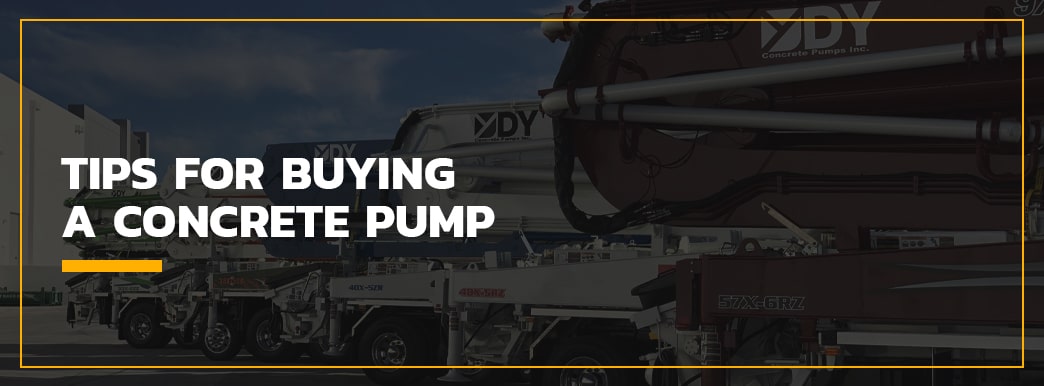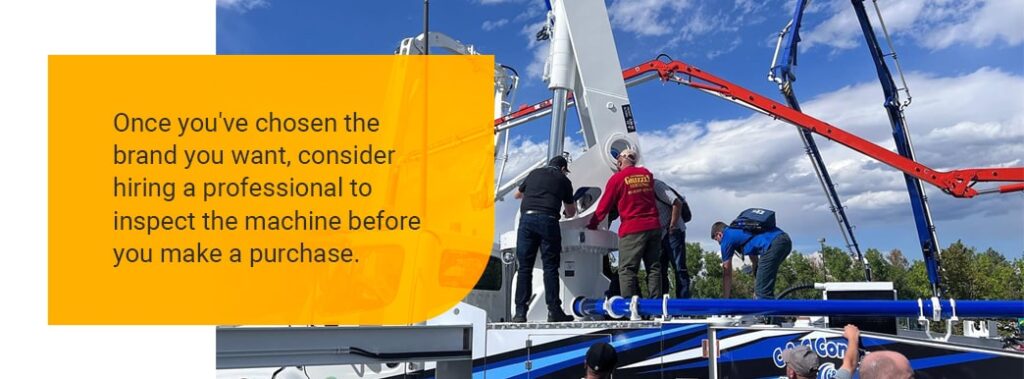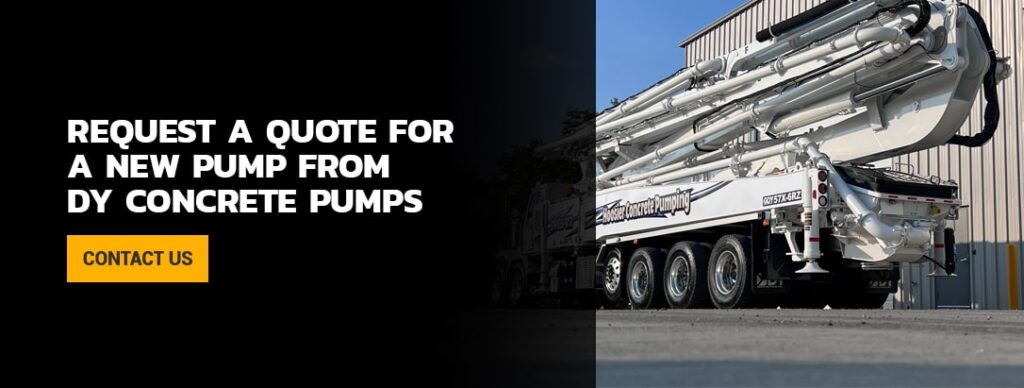Tips for Buying a Concrete Pump
Posted On: 10/10/2022 | Posted by: DY Concrete Pumps

Finding a concrete pump that fits your needs is essential to completing jobs quickly and efficiently. Whether you work in residential or commercial areas, there are various factors to consider before investing in a machine. Here are eight tips for buying a new concrete pump.
1. Choose the Type
The type of concrete pump you choose depends on your specific market and customer base. You also need to decide how much money you are willing to spend and whether investing in a new or used pump is a good idea. There are two types of concrete pumps — trailer or line pumps and boom pumps. Here are a few tips for buying the best concrete pump:
Trailer Pumps
Trailer pumps, also known as line pumps, are often used for residential pour, mud jacking, shotcrete, masonry grouting, cellular concrete or void fill applications. Most consider this concrete pump ideal for completing residential pours and reaching harder areas. A used line pump can cost you less money than a boom pump and, depending on your intended usage, can provide multiple revenue streams for your company. While able to complete various jobs, you can add numerous bells and whistles to best fit the specific client or assignment.
Boom Pumps
Boom pumps deliver a larger amount of concrete over a short period, letting you perform several jobs daily to maximize your profits and decrease time spent on the site. That said, boom pumps limit you to specific jobs like small slabs, basement floors or pool decks and also cost more than a line pump.
Special Additions
Consider fitting the machine with unique features to suit your specific job. Here are a few notable additions to keep in mind:
- Wireless remote control: A remote can help you control the pump without standing near the machine.
- Chemical additive pump: Adding chemicals to the concrete can help it move smoothly through the line.
- Hopper remixer: The hopper remixer helps mix and hold the concrete for pouring jobs.
- Electric motor: An electric motor can replace a gas or oil motor and may be better for the environment.
2. Consider Reviews and Feedback
Checking the reviews from previous clients and customers’ feedback on the pump’s quality can help ensure you find a durable and reliable pump. Check the inspection history, maintenance records and DOT or annual boom inspection if the state requires it.
Talk to previous owners to learn if the concrete pump is up to date or equipped with modern technology to handle the majority of concrete pours. You can also get in touch with the pump manufacturer to find the serial and boom serial numbers. The serial numbers should match the original manufacturer’s numbers, and any missing specifications mean you are dealing with an older boom that may not work as well.
Some concrete pumps do not require inspections by the state, so keep this in mind when looking for reviews and feedback from previous owners. However, getting a pump from an owner or retailer, rather than an auction house or broker, provides you with as much information about the machine as possible.
3. Choose the Brand Wisely
Choosing a brand can be confusing, considering the variety of options. Check out the companies and current manufacturers in the market to choose the brand wisely. Some more prominent brands may cost more than local businesses that offer better deals on high-quality products and machines.
If you’re unsure where to start, ask a friend or associate in the industry for some recommendations. You can find some trusted brands with reliable products that have been used in the United States for several years. A good rule of thumb is to avoid buying a brand of concrete pump that has gone out of business or is no longer supported by the manufacturer, as these will be harder to service if a part eventually requires replacement.

4. Complete a Pre-Inspection
Once you’ve chosen the brand you want, consider hiring a professional to inspect the machine before you make a purchase. They can check the pump’s quality, durability and reliability while giving you an overall review of the machine. The cost for a pre-inspection may be anywhere from a couple hundred to several thousand dollars, depending on the experience of the inspector and the distance they travel.
Before hiring someone for a pre-inspection, reach out to the manufacturer for more information and ask the current seller if they are comfortable with a new inspection.
5. Consider Output Ratio and Rate
The output ratio and rate are other aspects to consider before buying a concrete pump. You want a pump with fast delivery and volume control to slow the concrete delivery or set the output ratio according to the job’s needs.
The concrete pump output rate is often counted in cubic yards per hour, considering the vertical and horizontal pumping rates. Choosing the right kind of pump is essential for specific jobs. For example, a high-capacity pump is more suited for larger concrete applications, while a pump with a fast output rate requires a large team to place the concrete correctly.
6. Choose a Pump That Is Easy to Maintain
Whatever your current job requires, choose a pump that is easy to fix to help you keep up with cleaning and maintenance. You can also buy a pump with easy additions and functions such as a more straightforward piston design, easily accessible parts and fewer worn components.
Some other factors to consider include:
- Central lubrication system: This system lets the operator quickly grease each pump’s mechanism.
- Removable or hinged hopper: Removable and hinged hoppers provide easy cleaning after the concrete pouring is finished.
- High-quality materials: Materials that last long are less likely to wear over time.
7. Consider Performance Capability
You also want to understand the machine’s performance capability, such as the type of valve system or piston used in the pump. Most concrete pumps are proprietary or generic, meaning you should check each type of pump’s manufacturing details and system advantages before investing in a machine.
Other pumps are capable of multipurpose pours and come with various equipment that can handle several kinds of jobs. Remember — the maximum amount of concrete the machine can hold decides how much material you can pour.
8. Determine Your Budget
Making a budget and sticking to it is perhaps the most essential part of the buying process. Consider how much money you can spend and current concrete pump prices before purchasing a machine. Trailer and boom pump costs vary depending on the brand, model, age, condition and seller.
There are other factors to consider when it comes to your budgets, such as gear like pipe, clamps, reducers, hoses and various accessories. Consider if you’ll use a tow vehicle, single or double axle and what size of pump you want. Ask yourself what kind of truck insurance you will get and try to budget for yearly repairs and maintenance as well as backup savings in case of an accident or worn parts.
Request a Quote for a New Pump From DY Concrete Pumps
Since 1992, DY Concrete Pumps has provided high-quality concrete pumps and hydraulic cylinders from the United States. Our company offers competitive prices and a user-friendly pump design with sturdy steel and advanced welding techniques that serve your needs. If you need help buying a concrete pump, DY Concrete Pumps is here for you.
Contact us today to request a quote for your new pump.


 1-844-397-8677
1-844-397-8677



